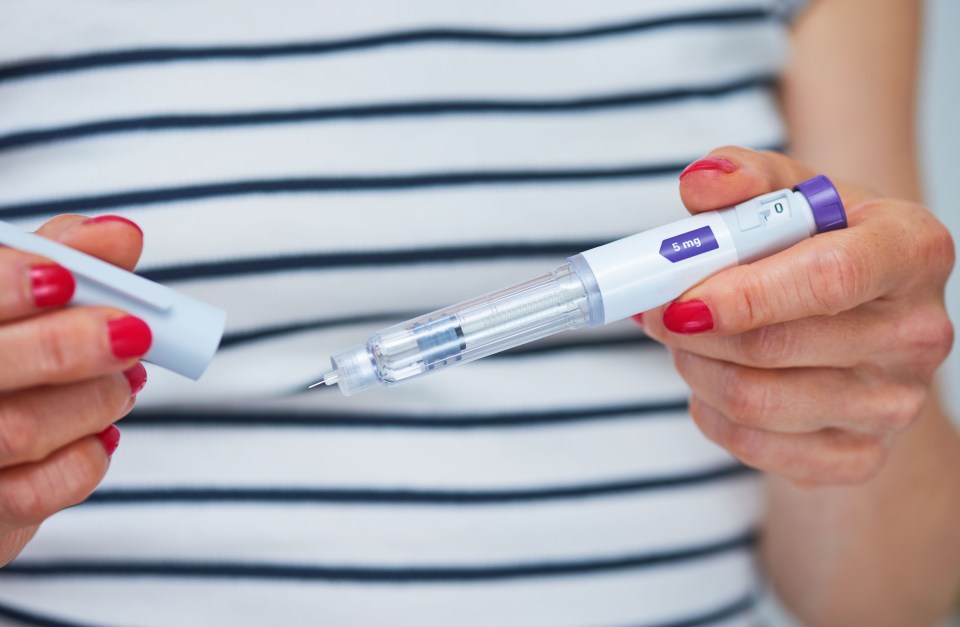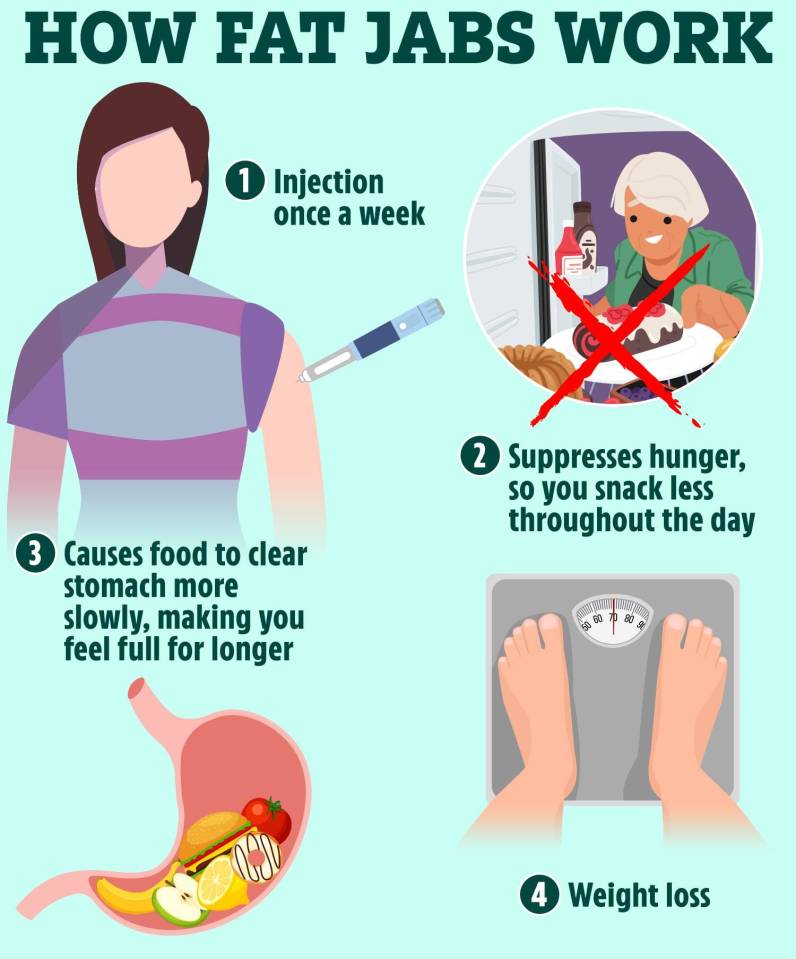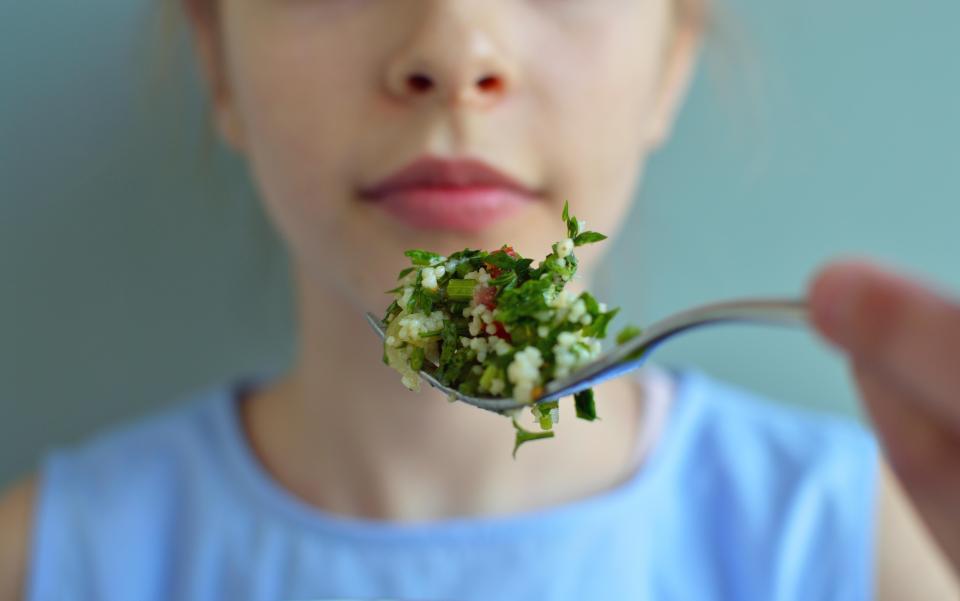THEY have been hailed as miracle injections for slimming – but even the most powerful of fat jabs won’t work if you ignore the oldest weight-loss rule in the book.
And now one GP has warned millions could be blunting the effects of Mounjaro and Wegovy… by making one simple slip-up.
It comes as frustrated users flock to social media to complain the GLP-1 weight loss shots aren’t living up to the hype.
“These medications can be powerful tools for weight loss, but they’re not magic, “Kirsten Davies, a nutritionist from weight loss drug provider CheqUp, tells Sun Health.
“Without the right approach to food, exercise and self-care, these drugs won’t work the way people expect them to.”
One Reddit user, who had taken Wegovy for six months, said: “I feel so discouraged and upset as I fought tooth and nail to get coverage on this medication just for it to not work.”
Another added: “Wegovy did nothing for me at all. I lost Zero weight, and yes, I was on the highest dose.”
One user even started a Reddit thread called ‘feeling broken on Mounjaro – it’s not working’, asking other people for help after gaining weight on the drug.
After six weeks on the jab, they said: “I see my body in the mirror and it looks bigger, I am always bloated.”
Another person who had been taking Mounjaro for “at least a year” said their hunger is getting “stronger and more frequent”.
“I’ve been pretty much nonstop famished”.
These drugs are part of a class known as glucagon-like peptide-1, or GLP-1 receptor agonists.
They mimic a natural gut hormone that helps regulate blood sugar, curb appetite, and slow digestion so you stay fuller for longer.
Clinical trials have revealed that more than 13 per cent of people taking semaglutide (Wegovy and Ozempic) and nine per cent of those on tirzepatide are “non-responders”.
That means they failed to lose at least five per cent of their body weight within the first three months.
Drink more water!
If you’re not seeing results, you might be missing the oldest rule in the book – drinking enough water.
“Dehydration is a common, yet indirect, side effect of weight loss injections,” Dr Crystal Wyllie, GP at Asda Online Doctor, says.
It’s something patients themselves have noticed. One Reddit user on Wegovy wrote: “I used to drink 3.5 litres of water every day, sometimes even more, but recently I’m struggling to reach even half that amount.
“I can tell how dehydrated but I still can’t get more water down.”
The drugs dull appetite, and in doing so, they can also blunt thirst signals.
Yet hydration is crucial for the body to function properly.
“Aim for two to three litres per day, sipping regularly, not just when thirsty.” Dr Wyllie explains.
“Hydration supports metabolism, digestion, and can reduce side effects like headaches, nausea and constipation.”
And even minor side effects, such as bloating or fatigue, can derail progress.
“Drinking enough water, increasing fibre slowly, and gentle exercise can help constipation,” he adds.
“If needed, over-the-counter remedies are an option, but talk to a pharmacist if symptoms persist.”
Here are the six other mistakes you could be making…
1. Time it right
Are you choosing the right day to take your jab?
One common mistake is expecting it to work instantly.
For example, taking it right before a takeaway, special occasion, or big night out in the hope it will stop you from overindulging.
Jason Murphy, head of pharmacy and weight loss expert at Chemist4U, says: “Taking the jab right before a takeaway or party won’t automatically stop you from indulging.
“Weight loss injections need time to build up in your system.
“They don’t blunt your appetite immediately after injection.
“It usually takes a few days to start feeling a difference, and several weeks for the full effects to settle in.”
Inject your dose mid-week if you plan for a heavier weekend.
2. Eat right
If the jabs are working, you shouldn’t feel the urge to overeat at mealtimes.
But skipping meals altogether can backfire, warns Dr Huang.
He explains: “If a person becomes extremely malnourished, their body goes into an emergency conservation state where their metabolism is slowed down to the extent that weight loss may plateau.
The goal is not starvation, which can have negative effects on brain, bone, muscles and long-term health
David Huang
“It also makes the weight loss very unsustainable in the long term, and there can be a bounce-back effect when patients re-feed.”
In other words, starving yourself will slow down your metabolism, making it harder to lose weight but easier to regain once you stop using the jabs.
“The goal is not starvation, which can have negative effects on brain, bone, muscles and long-term health,” Dr Huang says.
Kirsten says up to 80 per cent of her weight-loss clients skip breakfast, thinking it will help speed up weight loss, but it instead leaves you running on empty.
“It may seem harmless, but going too long without food can cause your blood sugar to drop and that signals stress to the body,” she warns.
“In response, your system releases cortisol, your primary stress hormone, which then tells your liver to release stored sugar into your bloodstream.
“This can lead to a blood sugar spike even though you haven’t eaten, which can lead to more cravings and so more weight gain.”
3. Food for thought
A key mistake with weight-loss jabs is not eating the right foods.
Since you’re eating less, it’s even more important to make sure your body is properly fuelled
“You can’t chase weight-loss treatments with burgers and expect miracles,” warns Mital Thakrar, a pharmacist from Well Pharmacy.
“Cut out sugary drinks and alcohol and focus on whole foods, lean proteins, fibre, and hydration.”
Protein, including lean meats, fish, eggs, beans, and tofu, protects muscles.
While fibre, found in fruit, vegetables, and nuts, keeps you fuller, stabilises blood sugar, and supports gut health.
Dr Vishal Aggarwal, Healthium Clinics, says: “Reduced protein intake can cause muscle loss rather than fat loss.
“Maintaining protein helps preserve muscle, supports metabolic health, and promotes sustainable weight loss.”
4. Are you jabbing correctly?
If you’re not seeing results, it could also be down to using the pen incorrectly, says Ana Carolina Goncalves, a pharmacist at Pharmica in Holborn, London.
But also, another common mistake is injecting the jab in the same spot each time.
“People often default to injecting in the same spot over and over, but this can cause local irritation or even small lumps of fat under the skin (lipohypertrophy), Dr Wyllie, explains.
“This can affect how well the medication is absorbed and make it less effective.”
She recommends rotating injection sites between the abdomen, thigh, and upper arm, and even picking different spots within those zones.
Ana explains how to use the pens correctly: Attach a fresh needle and turn the dial to the priming setting (usually shown with a droplet symbol or small number).
Your guide to eating right on weight loss jabs…
IT’S not just about consuming fewer calories, it’s about eating the right kinds of foods to ensure that you’re nourishing your body properly
Building a healthy relationship with foods rich in nutrients is key to sustainable weight loss and management.
A restrictive diet is not recommended on fat jabs.
In the early stages of treatment, it is strongly advised to nourish your body with nutrient-dense meals so that you receive the essential energy sources you need at a time of lifestyle adjustment.
- Breakfast: Avocado and poached eggs on rye bread or sourdough toast, blueberry and banana smoothie, easy overnight oats
- Lunch: Chicken salad, falafel with crunchy vegetables served in a wholemeal pitta, hearty vegetable and lentil soup
- Dinner: Salmon and broccoli pasta
- Snacks: Fresh fruits and vegetables, nuts and seeds, low-fat Greek-style yoghurt or kefir (fermented dairy drink packed with probiotics)
Source: ZAVA
5. Move it
It’s easy to see the jabs as a quick fix and let them do the heavy lifting.
“People might slow down or stop exercising altogether,” says Mr Thakrar.
“But exercise helps maintain muscle mass during weight loss, improves insulin sensitivity, and boosts mood and metabolism.”
Just 30 minutes of walking a day can help the meds work better by lowering blood pressure and improving overall well-being, he says.
Exercising to preserve muscle mass can help shape your body as you lose weight, which may be crucial if you are experiencing excess skin.
6. Quit it
One big mistake some people make with skinny jabs is stopping them too suddenly.
Mr Thakrar warns this can lead to rapid weight regain.
“There’s a tendency to ditch weight-loss treatments as soon as you reach your desired weight,” he says. “But that’s not our advice.”
A recent University of Oxford study found people typically return to their original weight within 10 months of stopping treatment, especially if lifestyle changes weren’t firmly established.
“Without the appetite suppression, hunger and cravings return quickly,” Mr Thakrar explains.
This includes healthier eating, which means cutting out junk food and alcohol while increasing protein and fibre, as well as exercising regularly.
“Building habits like these during treatment is key for sustaining results,” Mr Thakrar advises against stopping medication without medical advice.
“Many patients see improvements in blood sugar, cholesterol, and blood pressure,” he says.
But stopping too soon can reverse these gains if weight creeps back.
Are you eligible for fat jabs on the NHS?
TO be eligible for NHS weight loss injections, you typically need a high BMI (Body Mass Index) and a number of weight-related health conditions.
A BMI of 40 or more is usually required, or a BMI of 37.5 or more for certain ethnic groups.
For individuals from South Asian, Chinese, other Asian, Middle Eastern, Black African, or African-Caribbean ethnic backgrounds, a lower BMI of 37.5 or higher may be considered due to increased health risks at lower BMI levels within these groups.
Additionally, you must have at least three or four of the following conditions:
These injections are generally provided with a structured weight management programme that includes lifestyle support.
If you’re looking to access weight loss injections on the NHS, discuss your options with your GP.

















